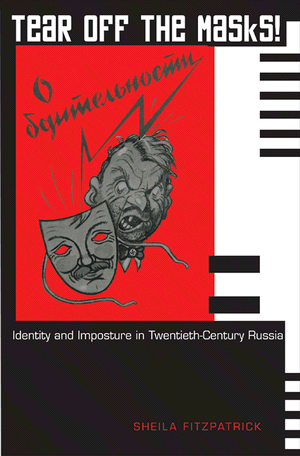
I've finished Anatoli Rybakov's Children of the Arbat - a novel about life in Russian during the reign of Stalin. It is a multi-faceted sweep across the vast Russian society during the mid-1930s as the purges were beginning and leading up to the assassination of Kirov. It looks at party loyalists, Stalinists, individualists, pragmatists, exiles, and the mind of Stalin himself. I've done several posts on it, here they are. It is an epic work with a broad view, but easy to read.
As I was finishing it, I noticed an article by Aileen Kelly in an old issue of The New York Review of Books that I hadn't read yet called Why They Believed in Stalin. It's a review of two recent books - Tear off the Masks! Identity and Imposture in Twentieth-Century Russia by Sheila Fitzpatrick and Revolution on My Mind: Writing a Diary Under Stalin by Jochen Hellbeck, which have different but not completely mutually exclusive views of how individual citizens lived with the violence committed in the name of Soviet revolution. Fitzpatrick's book looks at the strategy of obliterating a sense of individual self altogether:
Alexander Zinoviev depicted a new type of human being: Homo sovieticus, a "fairly disgusting creature" who was the end product of the Soviet regime's efforts to transform the population into emodiments of the values of communism.
Hellbeck looks at four diarists, whose journal reveal their strategies. These range from a slow evolution from a member of the old intelligentsia to eventual justification of violence in the service of the creation of "new forms of life," to an all-out campaign of perfecting the self as an instrument of revolution. Kelly quotes Hellbeck's final chapter:
Bolshevik activists were successful in propagating the urgency of individual growth through adherence to the revolution because such thinking was rooted in Russia's historical past. The moral duties of self-improvement, social activism, and self-expression in concert with history were a staple of Russian intellectual and political life for almost a century before the revolution of 1917. As Stalin-era diarists worked to align themselves with history and to achieve a historically grounded notion of selfhood, they acted in striking consistency with generations of educated Russians since the early nineteenth century. To behave in such ways was what distinguished a member of the Russian intelligentsia.
These both sound like fascinating books, I'm particularly drawn to the second one as diaries play into my interests in character, identity, psychology, acting, and the like. Next up for me, another novel on Russia, this one set just before the revolution and written by the English novelist Penelope Fitzgerald. The Beginning of Spring was recommended by novelist David Leavitt in one of his guest posts at The Elegant Variation.
















1 comment:
You'll like that wonderful book by Penelope Fitzgerald, I am sure!
Post a Comment